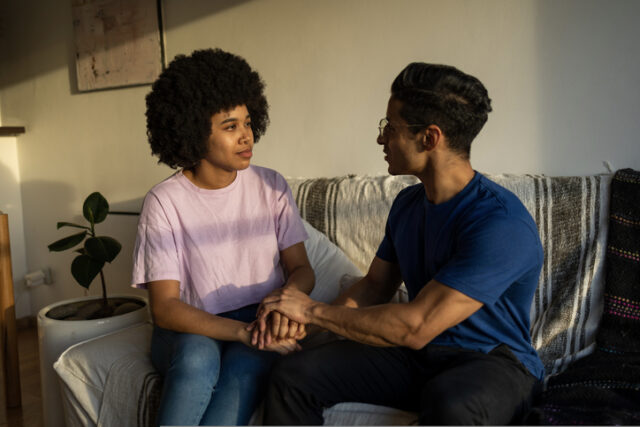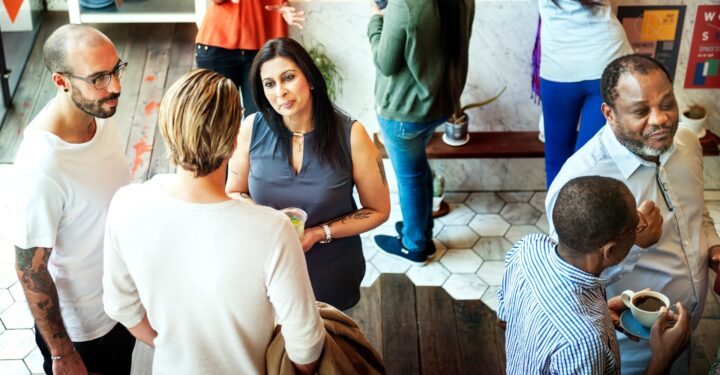Coming out is an intense and often vulnerable experience, and how you respond can have a huge impact on the person doing it.

The right words can make someone feel safe, supported, and accepted. However, some comments, even if they’re unintentional, can make them feel invalidated, judged, or even shunned for their sexuality. If you want to embrace the LGBTQ+ person in your life, here are a few things you should never say to them when they share their identity with you.
1. “Are you sure?”

Asking if someone is “sure” they’re not straight can imply doubt about their feelings or identity. Coming out is a process that requires a great deal of self-reflection and courage, and when someone is opening up to you, they’ve likely spent a lot of time understanding who they are. Questioning their certainty can undermine their experience.
2. “It’s just a phase.”

When someone tells you they’re queer, they’re sharing something personal and meaningful about their identity. Dismissing it as a “phase” invalidates their feelings and suggests that their identity is temporary or not to be taken seriously. It’s important to accept them for who they are, no matter where they are in their journey.
3. “I always knew!”

While you may feel like you’re being supportive by claiming you always knew, it can feel dismissive to someone who’s just gone through the emotional process of coming out. It may seem like you’re taking away their agency by implying that you already knew something about them that they hadn’t yet shared.
4. “But you don’t look gay/queer.”

There’s no “look” to being gay, bisexual, trans, etc. This comment perpetuates harmful stereotypes and invalidates people’s identities. It’s important to recognise that sexual orientation and gender identity are not defined by appearance or outward traits.
5. “Isn’t that hard for you?”

This might come from a place of concern, but it can imply that not being straight is inherently a hardship. While there can certainly be challenges, everyone’s experience is unique, and many people feel empowered and proud of their identity. The question could unintentionally make them feel like being LGBTQ+ is something to be pitied.
6. “I don’t care, but you should know that I’m straight.”

While it’s great that you’re trying to show support, announcing your own sexual orientation is unnecessary and can shift the focus back onto you. The person coming out needs space to express themselves, and your disclosure of being straight might make the conversation feel more about your comfort than theirs.
7. “Does this mean you’re going to hit on me?”

This kind of comment is inappropriate and objectifying. It assumes that someone’s sexual orientation defines their interactions with everyone, which isn’t the case. Being queer doesn’t mean they will make advances on everyone they meet — it’s about who they are attracted to, not how they behave toward other people.
8. “You don’t have to tell anyone else if you don’t want to.”

This may seem like a supportive comment, but it can inadvertently place a burden on someone to keep their identity hidden. The decision of whom to come out to is deeply personal, but suggesting that they “don’t have to” might imply that it’s not okay to be open about who they are. Encouraging open expression is important.
9. “I have a gay friend, so I get it.”

While it’s great that you’re trying to show empathy, claiming that you “get it” because of your one LGBTQ+ friend oversimplifies the experience. Everyone’s journey is unique, and just knowing someone else who is part of the community doesn’t automatically mean you understand the nuances of their experience.
10. “You’ll meet someone. It’ll get better.”

This comment can feel dismissive, as it focuses on the idea that the person’s identity will change or that they’re somehow incomplete. It’s important to recognise that their identity is already valid, and they don’t need to “meet someone” to make things better. It’s more about acceptance and self-love, not the promise of a future relationship.
11. “What do your parents think?”

Asking about their parents’ reaction to their coming out can feel intrusive. While you may be curious, it’s important to respect their privacy and recognise that family reactions can be complicated. They may not be ready to discuss it, or they might be facing challenges with family acceptance.
12. “You’re so brave.”

While “brave” is often intended as a compliment, it can make someone feel like their identity is something that needs to be commended. Coming out is a deeply personal experience, but it shouldn’t be framed as an act of heroism. Everyone deserves to feel comfortable in their identity without being put on a pedestal.
13. “Why didn’t you tell me sooner?”

This can come off as pressuring them to justify their timing. Coming out is a complex and emotional process, and they may not have felt ready or safe to share their identity before. The focus should be on offering support, not on when they chose to come out.
14. “But you’ve had a relationship with someone of the opposite sex.”

This comment invalidates someone’s identity by suggesting that they can’t truly be LGBTQ+ if they’ve been in a relationship with someone of the opposite sex. Sexuality is fluid, and it’s important to respect how someone defines themselves, regardless of past relationships.
15. “Are you really sure this is what you want?”

Questioning someone’s identity or choices in this way can come off as doubting their feelings and experiences. They’ve likely spent a lot of time figuring out who they are. Asking them to reconsider their identity can make them feel invalidated and unsupported.
16. “You’re just confused.”
 Source: Unsplash
Source: Unsplash This is one of the most dismissive things you can say. It undermines their entire experience and suggests that they don’t know themselves. Not being heterosexual is not a confusion — it’s a legitimate part of their identity that deserves respect and acceptance. Their journey of understanding their identity is valid, even if it differs from societal norms.




